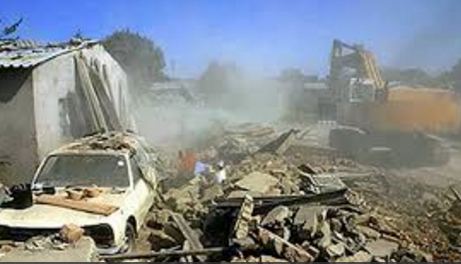Lovemore Lubinda|zwnews.com
As the population in Harare, Zimbabwe’s capital city continues to swell, so has the demand for accommodation, this has led to confusion in the housing sector, land ownership squabbles and demolitions leaving many homeless.
In some cases tempers have flared as people wield axes against one another, in some others land ownership fights have spilt into the courts, as the warring parties seek recourse. In a recent incident, more than four thousands families have been left in the open after their houses were flattened to the ground following a land rights dispute.
Members of the Tirivepano and Nyashadzamwari housing cooperatives are now counting their losses after Bak Storage, a company in the flight logistics business claimed the land on which the cooperative members had built their houses on, belongs to it, and was reserved for storing the company’s containers.
When the Zim News crew visited the scene yesterday, located few kilometres outside Harare city centre along the Harare-Masvingo road some of the affected people could be seen milling around, worried, and seem to be in deep thought as if contemplating their next move.
The housing backlog situation has been further compounded by the alleged corruption in the whole process of trying to get a stand. The media has of late been awash with such allegations and in some instances big names being thrown into the ring as having had their finger prints in the alleged scams.
Land barons have also taken advantage of the confusion in the system, the situation has provided fertile ground for malicious individuals masquerading as genuine land dealers, creating pseudo-cooperatives and swindling innocent would-be home seekers of their hard earned cash.
A prominent legal expert who has come across a number of cases of that nature in his day to day duties as a lawyer, Alec Muchadehama warns that the would-be members of cooperatives should always check with the relevant government ministry if a cooperative they want to join is registered before they become members.
“Where, the cooperative claims to own or to have acquired land, from either the City Council or Government or who ever, it is wise to verify such claims with the said authorities or seller before joining or entrusting any funds to it,” he says.
By doing so, he says, in the event that there are land ownership disputes, or elements of under hand dealings, one is able to get such information and use that knowledge to make wise decisions.
Harare is currently facing a huge housing backlog which is estimated to be above 600 000 housing units. Commenting on another story early this year, City of Harare spokesperson Michael Chideme told Zim News that Harare has its land zoned, where land use and ownership is clearly spelt out.
Chideme urged residents who seek to buy stands to always confirm with the relevant authorities if they land they are to acquire is reserved the purpose they intend to use it for, as well as to ascertain ownership of the land in question.
As pointed out by both Chideme and Muchadehama if residents make follow ups with various interested parties, they would be in a position identify whether ownership of the land they want is being disputed or not, before they commit themselves. This would save them time and money in the long run.
Meanwhile, the African Capacity Building Foundation (ACBF) have released its infrastructure development and financing in Sub-Saharan Africa occasional paper for 2016 which reveals that the region has the worst infrastructure deficit, including housing with studies pointing to lost growth opportunities. It points out that the Sub-Saharan Africa loses about $17 billion annually to various inefficiencies in infrastructure operations and spending.













